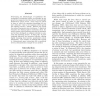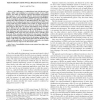166 search results - page 11 / 34 » Event Spaces and their Linear Logic |
143
click to vote
CONCUR
1999
Springer
15 years 6 months ago
1999
Springer
Abstract. The paper presents a partial order reduction method applicable to networks of timed automata. The advantage of the method is that it reduces both the number of explored c...
115
click to vote
AAAI
1996
15 years 3 months ago
1996
Overcoming the disadvantages of equidistant discretization of continuous actions, we introduce an approach that separates time into slices of varying length bordered by certain ev...
114
click to vote
DEBS
2008
ACM
15 years 3 months ago
2008
ACM
We propose a sensornet programming model based on declarative spatio-temporal constraints on events only, not sensors. Where previous approaches conflate events and sensors becaus...
112
click to vote
TCS
2002
15 years 1 months ago
2002
oole.stanford.edu/pub/ABSTRACTS Pratt, V.R., "Transition and Cancellation in Concurrency and Branching Time", Math. Structures in Comp. Sci., 13:4, 485-529, August 2003. ...
133
click to vote
TSMC
2010
14 years 8 months ago
2010
In a 2002 paper, we combined fuzzy logic with discrete-event systems (DESs) and established an automaton model of fuzzy DESs (FDESs). The model can effectively represent determinis...


